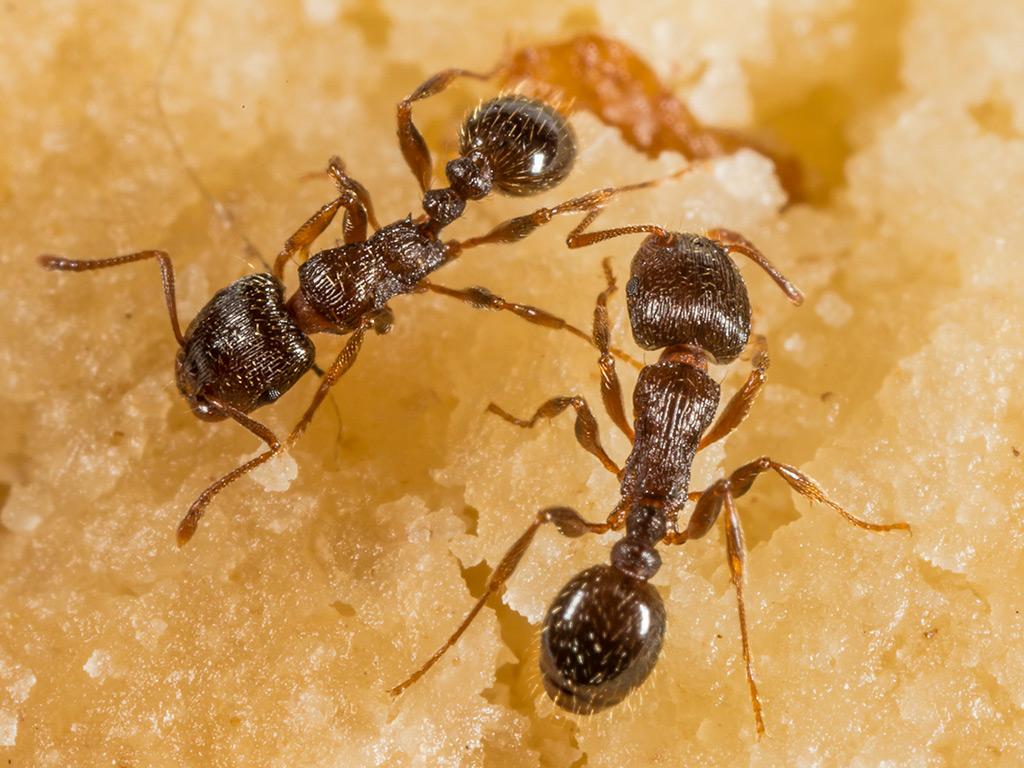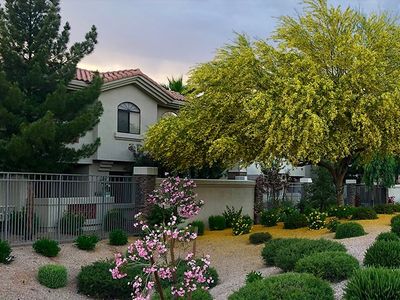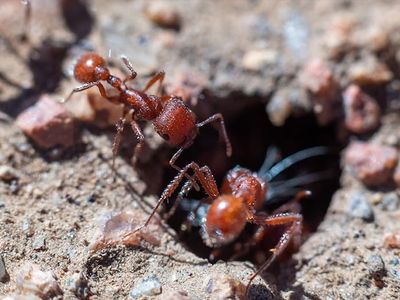What do pavement ants look like?
Pavement ants, known scientifically as Tetramorium caespitum, are tiny ants that often hang out near concrete, stone, and pavement. They are generally dark brown to black and have the three distinct body parts of an ant: head, thorax, and abdomen. Between the thorax and abdomen, on its petiole, are two nodes, which might look like two more body parts. But they are much smaller than the other three. Workers typically range from 1/10 to 1/8 of an inch in length, and the winged reproductives are twice this size. You'll find these ants building dirt mounds in your driveway, along walkways, and in the cracks of sidewalks.

What do pavement ants eat?
Pavement ants are omnivores and have a diverse diet. They are found consuming a variety of foods, including nectar, honeydew, and other sweet substances. They also eat sources of protein. Outdoors, these ants get their protein in the form of insects, multi-legged critters, and dead animals. Indoors, they'll find sweets and meats on floors, in cabinets, and inside food packages. They are also not averse to getting inside your kitchen trash, so make sure you keep it covered and take the trash out frequently.
Do pavement ants bite?
When an ant leaves a wound, we call it a bite, but it is a sting. Fire ants are the most notorious ants that sting. While pavement ants have a stinger that is able to penetrate human skin where it is thinnest, they rarely do this. Pavement ants are incredibly docile toward humans, but we wouldn't advise disturbing a nest, just in case.
Are pavement ants dangerous or destructive?
Pavement ants are not considered dangerous to humans. They do not pose any direct health risks, and their bites are usually harmless. However, they can become a nuisance when they infest indoor spaces or disturb outdoor activities. When infesting indoor spaces, they can go between trash and food storage, causing contamination and resulting in stomach illness. As far as whether or not they're destructive, we are happy to say that they are not. But they are a significant nuisance if they establish nests in or around buildings.
Where do pavement ants nest?
Pavement ants often nest in soil, beneath stones, along sidewalks, and around the foundations of buildings. They prefer nesting in sandy or gravelly soil. Nests can also be found in cracks in pavement, gaps in walls, and under debris. Indoors, they may nest in walls, insulation, or under floors. These ants can nest in a surprising variety of locations.
Do pavement ants come into the house?
If you read the last section, the obvious answer to this question is yes. They can find their way indoors if conditions allow. What typically happens is that these ants establish a nest near structures and start to accidentally find their way indoors through cracks in foundation slabs or gaps around utilities and exterior doors. Once inside, they may establish an indoor nest if they find favorable conditions, such as the availability of food. Sanitation can help to deter these insects from choosing to live indoors.
How do you get rid of pavement ants?
At Greenway Pest Solutions, our local pest control pros have the necessary tools and experience to tackle a pavement ant infestation indoors or outside. For complete pavement ant elimination in the Phoenix metro, reach out today to request a quote.
What can I do to prevent pavement ants?
To prevent pavement ant infestations, you can take several measures. Here are a few recommendations from our pest control experts:
- Seal cracks and gaps in the building's exterior.
- Keep food stored in airtight containers.
- Clean up spills and crumbs promptly.
- Remove sources of standing water.
- Trim vegetation away from the house.
- Properly dispose of outdoor trash.
- Regularly inspect and maintain your property to remove potential entry points.
You may also consider a year-round home pest control plan. Ongoing service comes with routine spot treatments in your yard to reduce pests. Since pavement ants eat these pests, controlling them will reduce food options. Along with this, your service comes with liquid applications to your exterior. These applications create a pest control barrier that stops ants and other pests from entering. For more information, please contact Greenway Pest Solutions.








